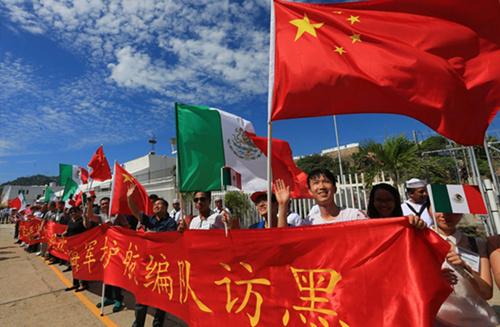Latin American studies necessary for national strategy
Author : DONG JINGSHENG Source : Chinese Social Sciences Today 2020-10-27

Representatives of overseas Chinese students in Mexico waved the national flags of China and Mexico to warmly welcome the visit of Chinese naval fleet to Mexico. Photo: CHINA TODAY
Since the 1980s, a full-swing development has followed China’s reform and opening up, prompting transformative modernization. Meanwhile, Chinese humanities and social sciences have rapidly developed, leading to fundamental changes in research subjects and perspectives. Within the field of Latin American studies, modernization has become a highly important and attractive research topic. In the mid and late 1980s, Mr. Luo Rongqu from Peking University first proposed and carried out research which approached modernization theories and the process of world modernization. Under his influence, Latin America’s modernization process has become the focus of Latin American studies in China. For many years, the annual meeting of the China Latin America Society and the China Latin America History Research Association shared a modernization theme. At the same time, many research results concerning the modernization of Latin America have been produced.
Generally speaking, scholars who specialize in contemporary issues generally study Latin America as a whole, discussing industrialization, agricultural modernization, political modernization, and the modernized international environment of Latin American countries. In addition, several studies have been published on the modernization process of individual countries, such as Brazil, Argentina, Chile, and Mexico.
However, the study of modernization in Latin America in the 21st century has been eclipsed by the glorious period of growth that this field experienced in the 1980s and 1990s. Historians advanced new research paradigms such as global history, transnational history, international history and a new cultural history which attracted growing attention and interest from Chinese academia in recent years. But this does not mean that modern research is out of date. In fact, there is much to build on from Luo’s discussion of Marxist modernization theory, and his distinct vision for modernization research. If further systematic research is carried out using his methodology and approach, modernization research could form a distinctive “Chinese school.” Pitifully, after Luo passed away, modernization research in China lost its prominence.
The modernization research that Luo advocated for was multi-disciplinary, a research innovation based in history which combined theoretical and empirical research. However, many of those who later studied modernization did not truly understand Western modernization theories, and did not fully grasp the ideas in Luo’s work New Theory of Modernization. Modernization became a vessel packed with too many concepts, which affected the reputation and development of modernization research.
During the 21st century, China-Latin America relations entered a new stage. Exchanges and cooperation between the two sides in politics, economics and trade, humanities, and other sectors made huge leaps. Latin American studies in China also ushered in a period of rapid development, and relevant institutions sprang up. The number of international and domestic academic conferences held in China has increased day by day, and it is much easier to visit Latin America today. Related research programs and research funds also greatly increased.
However, in a distinct shift from the past, today’s Latin American studies in China do not seem to have a centralized topic. In addition to discussions around China-Latin American relations, other research topics are relatively scattered. In a sense, this is a good thing, meaning the expanded field of research and enriched knowledge accumulation. But in another sense, it also shows that the Latin American field lacks an influential theory or paradigm to add academic appeal.
So how can the research improve? Apart from persistence, the following points are also suggested.
The first is to emphasize the study of Latin American history. China’s Latin American studies began with the history of the continent. In recent years, several research institutions of Latin American studies have been established in China. Some of them are under the management of Spanish and Portuguese majors in the university’s college of Foreign languages, while others are under the international politics major of the university. Researchers from these institutions usually have linguistic advantages but they generally lack the training of history and lack sufficient basic knowledge of Latin American history. Therefore, their research lacks in-depth historical analysis. History is the foundation of all humanities and social sciences. As far as Latin American studies are concerned, the understanding and mastery of Latin American history is the most fundamental.
Second, groundbreaking work, and new frontiers reached outside of China should be followed. Chinese scholars of Latin American history pay little attention to new research areas such as environmental history and women’s history.
Third, the relationship between basic research and applied research should be strengthened. As a branch of the social sciences and humanities, Latin American studies remain under the scope of basic research. However, due to the rapid development of China-Latin American relations in recent years, many government departments and enterprises need applied research in this field. Such applied research projects can deepen people’s understanding of Latin America in another sense, giving intuitive information. They do not weaken, but will promote basic research.
At present, China’s relationship with Latin America is entering a new stage. A Chinese national strategy is needed to strengthen its Latin American studies, as well as exchanges and cooperation between the two sides.
Dong Jingsheng is professor from the Department of History and director of Latin America Research Center at Peking University.
Ye Shengtao made Chinese fairy tales from a wilderness
Ye Shengtao (1894–1988) created the first collection of fairy tales in the history of Chinese children’s literature...
-
How northern ethnicities integrated into Chinese nation
2023-09-18
-
Mogao caves
2023-09-12
-
Mogao Grottoes as ‘a place of pilgrimage’
2023-09-12
-
Time-honored architectural traditions in China
2023-08-29
-
Disentangling the civilizational evolution of China
2023-08-28
-
AI ethics in science fiction
2023-08-23














 2011-2013 by www.cssn.cn. All Rights Reserved
2011-2013 by www.cssn.cn. All Rights Reserved